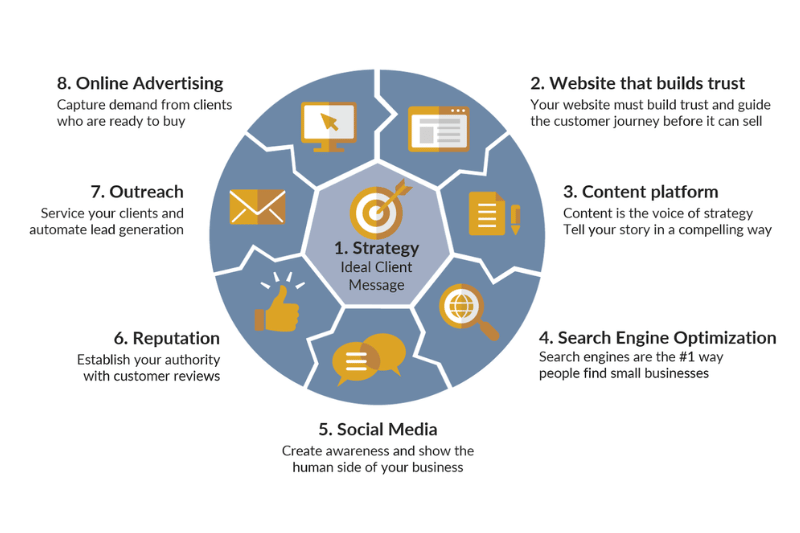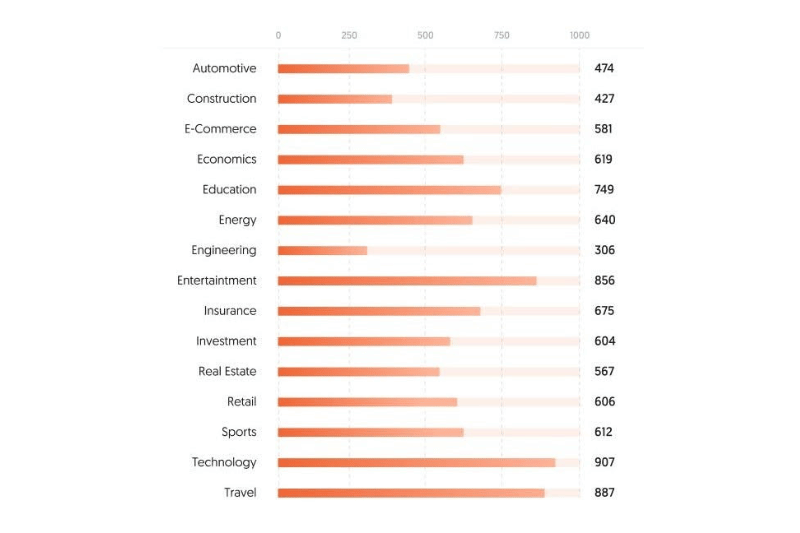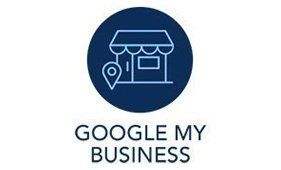The Best SEO Tips: Why Keywords Are So Important To Being Found Online
Why Keywords Are So Important to Being Found Online
If you want search engines to know about the content found on your web page, you need to learn the value of SEO keywords. The right keywords help you target the right audience and increase your site's traffic.
What Are SEO Keywords?
When it comes to search engine optimization, commonly known as “SEO, “a keyword is a word or phrase used by someone to find more information about their problem or topic in which they are interested. For a user to find your company, search engines rely on these SEO keywords in your content.
They help people and search engines determine what your website is about and what benefits you have to offer them. This is why keyword research is the foundation of the success of your site, from the written content on your web pages to your blog posts.
Keyword research is one of the most important SEO tips we can suggest. You can find the keywords you want to rank through some research.
What Determines a Good Keyword?
Let’s back up a few steps – you will need to understand what makes a good keyword. These are the things you should look for:
- Look at the
monthly search volume of the keyword phrase. This tells you the number of people searching for that keyword in Google and other search engines.
- Look at the competition level of the keyword. The competition level refers to how many sites are also optimizing on that same keyword and how much effort you will need to put into being found based on this keyword. High competition would mean you would have to create more content optimized for this keyword to compete on ranking higher when people search for it.
Types of Keywords
There are two basic types of keywords, which are broad keywords and long tail keywords. Broad keywords, as the name implies, are short phrases that cast a wide net. Some examples of broad matches are:
- Coffee
- Shoes
- Plumbing
- SEO Tips
A long tail keyword is a longer search term consisting of a few different words that narrow down a broad topic. Some more specific long tail keyword examples include:
- Coffee shops in Denver
- Blue women’s shoes
- Plumbing services in Los Angeles
- SEO Tips for beauty salons
Long tail keywords are much easier to rank because they narrow down the competition. They also bring in more relevant traffic, which could result in a conversion, i.e. a phone call, email, or purchase.
In addition to these SEO keyword examples, there are a few more terms we should mention to give you a better answer to the question of—what are SEO keywords.
Semantic Keyword
Semantic keywords are closely related to the original keyword. So, these terms give the spiders on the search engines more insight regarding the topic and information it provides. The search engine algorithm uses semantic keywords to accurately rank the page. In easier terms, semantic keywords set out to mimic natural language. These keywords allow you to build more meaning and help Google crawlers understand your content better.
Short Tail Keyword
A short tail keyword is also commonly known as a head keyword or a head term. It is usually one to three words that cover a broad topic. A short tail keyword has a higher search volume compared to a long tail keyword. This means a head keyword can attract even more visitors to your website.
Informational Keyword
An informational keyword is one that a user enters into a search query for more information about something like a service, product, or guide. The search intent is to find more information about the topic they are interested in.
Where to Find the Right Keywords
Now that you’ve mastered one of the most important SEO tips, you will need to know where to go to research keywords. Luckily there are a number of tools that will help you find the right keywords to target.
You can use
Google Keyword Planner to type in terms relevant to your business, and it will provide you with not only the search volume and competition but a list of relevant terms that will help you expand into more long tail phrases. Here are some tips on finding the best keywords for SEO.
- Before using a keyword research tool or other SEO tools to find keywords, you need to learn about your customers. Gain an understanding of their pain points and what products or services they need.
- Build your seed keyword list. Now that you know the different types of keywords and what they do, you can start building your keyword list. Make sure they describe what you have to offer.
- Gather keyword data. You can use keyword ranking tools like Google Search Console to generate a list of keywords that can drive website traffic.
- Expand further with other keyword research tools like Keywords Everywhere on Google.
- Group your terms by search intent, categorizing your keywords by audience type, funnel, or topic.
Why Are SEO Keywords Important?
Since keywords tell search engines about the content of your web pages, they prove to be important for SEO. Google uses this information to determine what content is relevant to a search query and how the web page should rank in searches for a particular term.
How to Get the Most Out of Your Keywords
Now for the tricky part. Unfortunately, it isn’t as easy as plugging in the keywords over and over. Keyword placement is an art mastered through continuously creating fresh and relevant content.
When you’re writing a blog post or any other form of content, remember you are writing for humans first. As long as you provide your audience with quality information that they will enjoy, Google will push your page to the top of the search engine results page (SERP).
SEO keyword research is an essential component of your content marketing strategy. You can greatly increase the visibility of your business with the right keyword and, in turn, grow your customer base and revenue.
Long Tail vs Head Keyword
Long tail keywords have a low search volume, low ranking competition, high converting traffic, many words, and are best for lower-level pages and singular search intent. A head keyword, on the other hand, is the opposite of this. A head keyword has a higher search volume and ranking competition, lower converting traffic, fewer words, and are best for top-level pages and multiple search intents.
Secondary vs Primary Keyword
A primary keyword is the target or focus used in the context of your site or web page. Secondary keywords are supporting and are used loosely when optimizing and are not considered a high priority.
More of the Best SEO Tips
Here are a few more of the best SEO tips to keep in mind as you build a more effective content marketing strategy to increase the keyword ranking for your site.
Target a Primary Keyword
Again, keyword research will prove to be the foundation of any SEO strategy. You can attract more traffic to your site when you use the right keyword effectively. The first step is identifying your primary keyword and then finding secondary keywords that go with it.
The primary keyword will be the main focus of the content. Each page only needs to have one primary keyword. Make sure this keyword aligns with your brand identity, the products you offer, the focus of the page, and your services.
Simply enter a seed keyword that aligns with your focus and has a lower keyword difficulty. Look at the Questions and Related Keywords sections the keyword research tool provides so you can build a solid list of supporting keywords you can potentially use.
Write Unique Content
The next best SEO tip to improve your content marketing strategy is to write quality, unique content for your site. The content should be original, detailed, comprehensive, and evergreen so it covers the search intent of the user on the hunt for more information.
Original content allows the audience to begin building a relationship with you, and you offer the answers they are looking for. Having more comprehensive pages filled with relevant and valuable content also shows search engines that you are an authority on that particular topic.
Evergreen content provides more long term value for the site and will continue to remain relevant and attract website traffic for an extended period. You can build on evergreen content without having to make huge updates to the content like you would with time-sensitive information or seasonal information you include on a web page.
Content Formatting for Search Engines
For any content to rank well, it needs to answer the user's questions. You can do this with a featured snippet. This appears at the top of the page results on Google and answers the audience's question without making them leave the search engine results page. A featured snippet is highly visible and can attract more organic traffic because it is above the numbered results on the page.
Link Building
Backlinks or external links that lead to your web page are another factor that plays a role in ranking the content. Include links from reputable sources to increase the authority your site has. It will also improve your SEO over time.
For the best link building strategy, you need to find where your competitors are getting their backlinks from and use this information to find new opportunities for your web page. The Backlink Gap tool is another SEO tool you can use to help find quality backlinks.
In addition to backlinks when link building, you also want to use internal links. Internal links help Google understand and rank the quality content you have. Internal links with descriptive anchor text show Google which web pages of the site are important and tell Google what they are about.
Create a Google Business Profile
A Google Business Profile, formerly known as Google My Business, is a free feature Google offers that can help optimize the online presence of a business and helps with local search results.
To further optimize your Google Business Profile account and improve
local rankings, verify the business, fill out the Google business profile completely, and ensure all information is up to date and accurate.
Optimize Meta Description and Page Title
The meta description and page title are important because it is the first search result the audience sees. The meta description and page title will entice the user to click on your page or skip and go to the next on the search result page.
If you use WordPress SEO, you will see two boxes: SEO Title and meta description. This makes it easy to edit the page title and meta description.
When creating or editing the meta description or title, keep the page title between 30 and 60 characters and the meta description under 160 characters. You also want to include your target keyword phrase and make sure you tell the audience what the web page is about. The title and meta for each web page should be unique.
Use Google Analytics to Track Performance
Google Analytics for SEO can help improve the overall performance of your website and helps you spot potential problems early on so they can be addressed. Google Analytics helps you find low-hanging opportunities to boost your website traffic.
The Performance Report you can find in Google Search Console is a good way to use Google Analytics. They provide conversion data and show the connection between your SEO efforts and business metrics.
This information also helps improve landing pages that contribute to conversions, find keyword opportunities by tracking internal site searches, set alerts for 404 errors, and automate organic traffic dips and spikes so you can adjust accordingly.
Are you ready to improve your digital marketing strategy and find other ways SEO can help you rank? We can help you save costs, attract new leads, and grow your business more effectively.
Mawazo Marketing approaches all content strategies with relevant keyword research, content planning and constant evaluation for improved results.
Contact us for an evaluation of your current SEO strategy and consultation.
Do you have any questions on the above, or would you like to share your experience? Just email ideas@mawazo.ca or call +1 (833) 503-0807.
At Mawazo Marketing we work with owners of B2B companies who want to accelerate their business. We help them with a concrete digital growth plan, a website that saves operational cost, and a digital marketing system that generates leads. For qualifying clients we offer a 5x ROI guarantee: if we don't reach the objective, then we pay back the difference. Book a Free Strategy Session to find out more.













